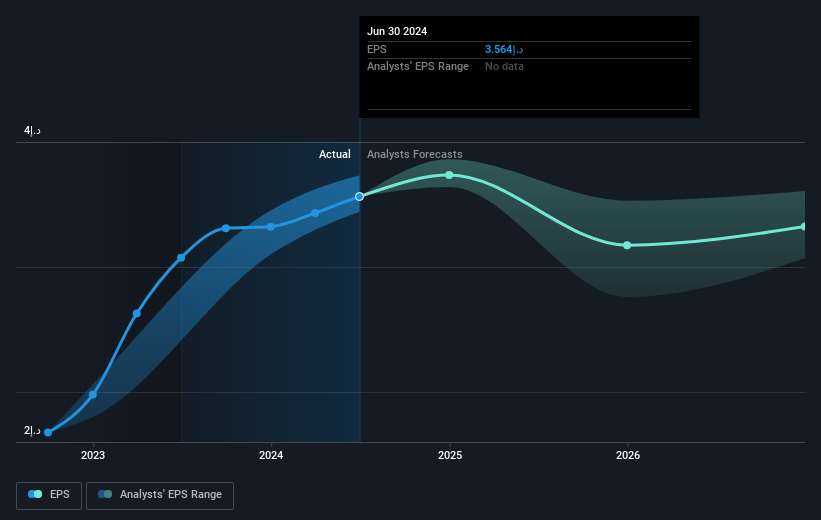- United Arab Emirates
- /
- Banks
- /
- DFM:EMIRATESNBD
Those who invested in Emirates NBD Bank PJSC (DFM:EMIRATESNBD) five years ago are up 119%

Stock pickers are generally looking for stocks that will outperform the broader market. And while active stock picking involves risks (and requires diversification) it can also provide excess returns. For example, long term Emirates NBD Bank PJSC (DFM:EMIRATESNBD) shareholders have enjoyed a 72% share price rise over the last half decade, well in excess of the market return of around 46% (not including dividends). On the other hand, the more recent gains haven't been so impressive, with shareholders gaining just 23%, including dividends.
Let's take a look at the underlying fundamentals over the longer term, and see if they've been consistent with shareholders returns.
View our latest analysis for Emirates NBD Bank PJSC
There is no denying that markets are sometimes efficient, but prices do not always reflect underlying business performance. By comparing earnings per share (EPS) and share price changes over time, we can get a feel for how investor attitudes to a company have morphed over time.
During five years of share price growth, Emirates NBD Bank PJSC achieved compound earnings per share (EPS) growth of 15% per year. This EPS growth is higher than the 12% average annual increase in the share price. Therefore, it seems the market has become relatively pessimistic about the company. The reasonably low P/E ratio of 5.55 also suggests market apprehension.
The image below shows how EPS has tracked over time (if you click on the image you can see greater detail).

It is of course excellent to see how Emirates NBD Bank PJSC has grown profits over the years, but the future is more important for shareholders. Take a more thorough look at Emirates NBD Bank PJSC's financial health with this free report on its balance sheet.
What About Dividends?
As well as measuring the share price return, investors should also consider the total shareholder return (TSR). The TSR is a return calculation that accounts for the value of cash dividends (assuming that any dividend received was reinvested) and the calculated value of any discounted capital raisings and spin-offs. So for companies that pay a generous dividend, the TSR is often a lot higher than the share price return. As it happens, Emirates NBD Bank PJSC's TSR for the last 5 years was 119%, which exceeds the share price return mentioned earlier. The dividends paid by the company have thusly boosted the total shareholder return.
A Different Perspective
It's good to see that Emirates NBD Bank PJSC has rewarded shareholders with a total shareholder return of 23% in the last twelve months. Of course, that includes the dividend. That's better than the annualised return of 17% over half a decade, implying that the company is doing better recently. Given the share price momentum remains strong, it might be worth taking a closer look at the stock, lest you miss an opportunity. While it is well worth considering the different impacts that market conditions can have on the share price, there are other factors that are even more important. Consider risks, for instance. Every company has them, and we've spotted 1 warning sign for Emirates NBD Bank PJSC you should know about.
But note: Emirates NBD Bank PJSC may not be the best stock to buy. So take a peek at this free list of interesting companies with past earnings growth (and further growth forecast).
Please note, the market returns quoted in this article reflect the market weighted average returns of stocks that currently trade on Emirian exchanges.
Valuation is complex, but we're here to simplify it.
Discover if Emirates NBD Bank PJSC might be undervalued or overvalued with our detailed analysis, featuring fair value estimates, potential risks, dividends, insider trades, and its financial condition.
Access Free AnalysisHave feedback on this article? Concerned about the content? Get in touch with us directly. Alternatively, email editorial-team (at) simplywallst.com.
This article by Simply Wall St is general in nature. We provide commentary based on historical data and analyst forecasts only using an unbiased methodology and our articles are not intended to be financial advice. It does not constitute a recommendation to buy or sell any stock, and does not take account of your objectives, or your financial situation. We aim to bring you long-term focused analysis driven by fundamental data. Note that our analysis may not factor in the latest price-sensitive company announcements or qualitative material. Simply Wall St has no position in any stocks mentioned.
About DFM:EMIRATESNBD
Emirates NBD Bank PJSC
Provides corporate, institutional, retail, treasury, and Islamic banking services.
Excellent balance sheet established dividend payer.


